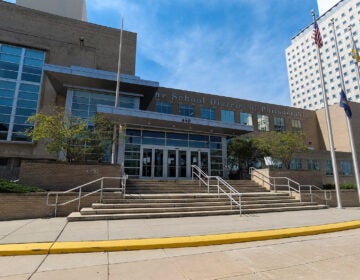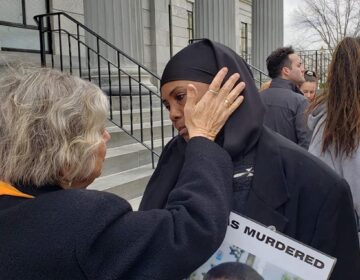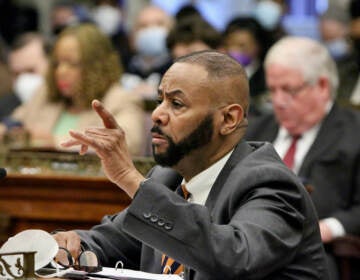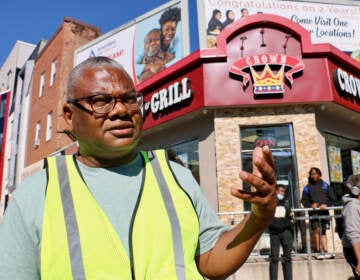Community members gather in South Philly for discussion on policing, stop and frisk debate
Some community members say they understand why City leaders are calling for the return of stop-and-frisk measures, but worry policy could backfire.
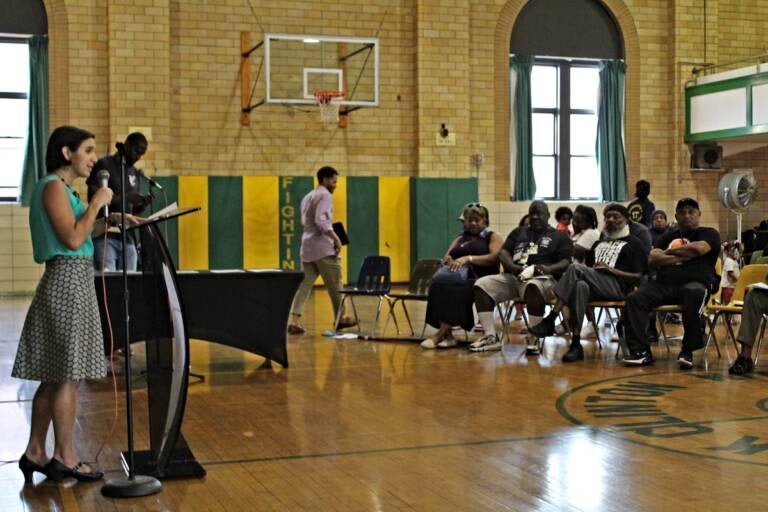
Gun violence and prevention reporter Sammy Caiola moderated a community conversation at St. Gabriel's Auditorium in South Philadelphia on Aug. 24, 2022. (Cory Sharber/WHYY)
A small crowd gathered Wednesday night at St. Gabriel’s Auditorium to discuss possible solutions to the rising gun violence that has been plaguing Philadelphia. One suggestion is to reintroduce the “stop-and-frisk” police policy.
For several years, Philly Police have moved away from the controversial and historically racist tactic, but following a string of violent gun incidents this summer, some City Council members have been discussing it.
Reuben Jones is with Frontline Dads, a nonprofit organization focusing on the empowerment of Black youth.
He says he understands why people are calling for stop-and-frisk measures to return, but worries that could backfire.
“Technically they’re supposed to be stopping folks looking for guns when they have a reasonable suspicion that there’s a gun present,” Jones said. “They haven’t done a real good job at finding guns in these stop and searches. What they found was Black men who are on probation or parole who end up getting violated and sent back to jail basically without committing a crime.”

Black Philadelphians make up about 44% of the city’s population, but made up 71% of all stops in the second half of 2019 and were 50% more likely to be illegally stopped, especially for minor “quality of life” crimes, like panhandling or carrying an open container.
A 2020 report found that around 16% of stops were still illegal, as were 32% of the pat-downs police performed.
Deputy Inspector General Adam Geer says without reasonable suspicion, an officer conducting the measure is unconstitutional.
He says he would want to hear about any illegal procedures being done.
“That is not the way that this country operates,” Geer said. “That is not what the police department should be doing. And we would want to know about that practice and get to the bottom of it, right?”
Philadelphia police must have “reasonable suspicion of criminal conduct” in order to make a stop, and that frisks should be undertaken “only where there is reasonable suspicion that the person stopped is armed and dangerous.”
In 2010, the Pennsylvania ACLU and a private law firm sued the city in federal court on behalf of a group of Black and Latino men whom police had stopped solely because of their race or ethnicity. The parties settled the case the following year, with the city agreeing to a consent decree.
In 2009, before the lawsuit, Philadelphia had been performing more stops per capita than any other major city. Almost 90% of the people stopped were Black or Latino.
If you or someone you know has been affected by gun violence in Philadelphia, you can find grief support and resources here.
WHYY is your source for fact-based, in-depth journalism and information. As a nonprofit organization, we rely on financial support from readers like you. Please give today.




